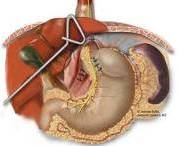What is reflux surgery?
Anti reflux surgery is surgery performed to correct gastro-oesophageal reflux disease (GORD). Click on GORD to learn more about this disease.
The most common operation to correct GORD is called Nissen fundoplication.
What is involved in the operation?
Advances in keyhole (laparoscopic) surgery has made operations for GORD much more common. The main reason for this is a greatly reduced hospital stay, less pain and a more rapid recovery period.
The operation involves admission to hospital, usually the day of surgery and a full (general) anaesthetic. Once the patient is asleep, a fine tube is passed into the stomach via the nose, known as a nasogastric tube. This allows the stomach to be emptied.
The procedure is done with laparoscopy (link) surgery. Five small (5mm) incisions are made on the abdomen and the normally collapsed abdomen is inflated with carbon dioxide. The laparoscope is passed into the abdominal cavity through ports inserted in these incisions. A laparoscope or thin telescope attached to a video camera allows the surgeon to visualise the stomach and lower oesophagus. The procedure is then carried out using specially designed laparoscopic instruments.
The lower oesophageus and stomach are then mobilised or freed from their attachments. This allows part of the stomach to be wrapped around the lower part of the oesophagus and secured there with stitches. This is done to strengthen the faulty valve mechanism of the lower oesophagus that causes GORD.

What complications can occur from the operation?
Nissen fundoplication is a common and very safe procedure, but despite the high standards of surgical practice, complications can occur. The possible complications from this surgery include
- Injury to the oesophagus or stomach
- The operation may not relieve symptoms sufficiently – this is very rare.
- The operation may work too well – this can lead to difficulty in swallowing as the valve created is too tight. This normally resolves by itself in most people with time. Some patients may require a minor procedure known as dilation to correct this. Very rarely, re-operation is required.
- Injury Due to Trocar Placement. To allow the smooth insertion and removal of laparoscopic instruments in and out of the abdominal cavity, short, hollow ports are used. Insertion of these ports is done under vision, but rarely injury to blood vessels or underlying bowel may occur which require repair.
- Bleeding/Infection.?Significant bleeding during or following the operation is rare. Post operative infection within the abdomen or wound infection are also rare complications. These complications are reduced by the administration of a single dose of antibiotic at the time of operation.
- Conversion to Open Operation.?In less than 1% of cases, the procedure is unable to be completed laparoscopically (keyhole surgery). In these cases, open surgery is performed. The most common reason for conversion is due to scar tissue present in patients who have had previous operations.
What will I be like after the operation?
Laparoscopic surgery has revolutionised many surgical procedures. The greatest advantage of laparoscopic surgery is significantly reduced post operative pain and quicker recovery time. Following the procedure, a drip to administer fluids will remain as well as the nasogastric tube.
The following day, a special X-ray test is performed to ensure there has been no damage to the stomach or oesophagus. Once this has been cleared, the nasogastric tube is removed and a diet is slowly introduced.
Mobilisation is encouraged early with the aid of pain medications. Patients are able to return home once they are mobilising independently, pain control is achieved with oral medications and they are tolerating a normal diet. This is generally achieved between two and four days following the operation.
Following discharge, you will need a routine follow up with Dr. Braun, approximately four weeks after you have been discharged.
To schedule a surgical consultation with Dr Braun, please contact us or call direct on 07 3353 9694
